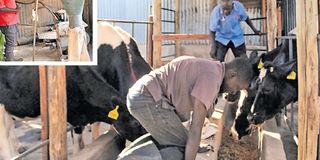Family dairy farm that pays members salaries

Eli Matende and their father Jeremiah Matende on their farm in Lugari and (inset) John Matende at the feed-making plant in their farm in Kakamega. They say they are able to pay salaries from milk sales because they have been able to lower the cost of producing the product to less than Sh20 per litre by growing maize for silage and desmodium throughout the year and formulating their own dairy meal as well as mechanising the farm. PHOTOS | STANLEY KIMUGE | NMG
What you need to know:
- The mode of operation has propelled the farm to greater heights since they started in 2008.
- Back in the village, they realised that their father was struggling to get milk from his two indigenous cows, which he transported for 3km to one customer.
- The brothers say they are able to pay salaries from milk sales because they have been able to lower the cost of producing the product to less than Sh20 per litre by growing maize for silage and desmodium throughout the year and formulating their own dairy meal as well as mechanising the farm.
- On the farm, they have a milling and silage chopping machines, both powered by diesel. The milling machine is used mainly to grind dry grains.
As the month starts, Matende Farm in Mugumu village, Lugari, Kakamega County, is preparing to pay salaries.
Well, that is not unusual as it is what is expected of a business, but those to receive Sh25,000 each are brothers Elly and John Matende, together with their parents, money accrued from milk sales.
“We are a family of nine and out of all the members, the four of us are actively involved on the farm. My father takes care of record-keeping, my mother cleanliness while John and I are in-charge of day-to-day operations,” says Elly, 35.
At the end of the year, he adds, all the family members are entitled to royalties or dividends of between Sh30,000 and Sh50,000 from milk sales, savings and sale of dairy cows.
“This is a way of making everyone feel part of the farm since we all contributed some capital. This also discourages any member of the family from thinking of land subdivision.”
The mode of operation has propelled the farm to greater heights since they started in 2008. John recounts that their foray into business was started in 2005 by their father, who engaged in transport, leasing tents and fruit business in Nakuru.
“The business was doing well until 2007 when the post-election violence happened and we lost some property. This affected my father and he returned home to do farming,” says John.
Back in the village, they realised that their father was struggling to get milk from his two indigenous cows, which he transported for 3km to one customer.
“We decided to join hands with him and run the farm. We first bought a Friesian cow from Nakuru after raising Sh600,000 seed capital, part of which came from the sale of some assets in the town. We later added two more Friesian breeds, constructed a zero-grazing unit and bought a chaff cutter,” says John.
Today, the farm boasts of 12 Friesian dairy cows, with the brothers milking 100 litres daily from four that are lactating.
“We breed and sell the heifers. Last year, we had a herd of 20 cows but sold eight because we did not have adequate infrastructure to keep them. Our high-yielding cow produces 42 litres of milk a day,” says John, who holds a diploma in business information systems.
DEPENDING ON BODY WEIGHT
They sell part of their milk (30 litres) to Lukumu Farmers Cooperative Society and Naitiri Dairy Farmers Cooperative in the neighbouring Bungoma County at Sh35 per litre. The rest they sell to locals at Sh50 per litre.
The brothers say they are able to pay salaries from milk sales because they have been able to lower the cost of producing the product to less than Sh20 per litre by growing maize for silage and desmodium throughout the year and formulating their own dairy meal as well as mechanising the farm.
“We mix cotton seed cake, soya bean, wheat bran and either maize germ or whole maize, depending on which is cheaper at the time of the year, to formulate our own dairy meal,” explains Elly.
They feed their cows depending on body weight. For a lactating cow, they give it 24kg of feeds, 12kg in the morning and the rest in the evening.
“The feed comprises 6kg of maize silage, a kilo of desmodium and 5kg of dairy meal. On the other hand, drying cows get 10kg of silage, a kilo of dairy meal and desmodium,” he offers, adding erratic rains that affect fodder production and poor road network are some of the challenges they grapple with.
Normally, a cow consumes two bales of hay a day, which costs between Sh400 and Sh600, but instead of hay, they use silage made from the maize they farm twice a year on 11 acres.
On the farm, they have a milling and silage chopping machines, both powered by diesel. The milling machine is used mainly to grind dry grains.
They used to spend Sh10,000 on hiring the machines to do the work but now they just use Sh1,000 on diesel.
The brothers say they have amassed knowledge on dairy farming from YouTube videos, fellow farmers and trainings from Smallholder Dairy Commercialisation Programme, which is run by Ministry of Agriculture and the International Fund for Agricultural Development.
They are looking to install a biogas unit to enable them use the gas to run the farm and reduce further the cost of production.
“We have learnt a lot from our father who emulated how the Asians support their children and did the same with us,” says John.





